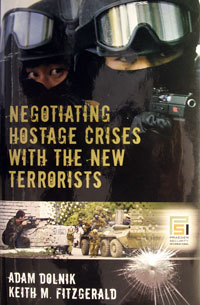Negotiating Hostage Crises with the New Terrorists

|
|
By Adam Dolnik and EPIIC Alumnus Keith Fitzgerald (A '91)
About the book:
This book is about the role of negotiation in resolving terrorist barricade hostage crises. What lessons can be learned from past deadly incidents so that crisis negotiators and decision makers can act with greater effectiveness in the future? What are the lessons the terrorists are learning and how will they affect the dynamics of future incidents? What can we learn about the terrorist threat, and about preventing the escalation of future terrorist hostage-taking situations?
While there are many trained crisis negotiators around the world, almost none of them has ever had contact with a terrorist hostage-taking incident. Further, the entire training program of most hostage negotiators focuses on resolving crises that do not take into consideration issues such as ideology, religion, or the differing sets of strategic objectives and mindsets of ideological hostage takers. This is especially true with regard to the terrorists of the "new" breed, who have become less discriminate, more lethal, and more willing to execute hostages and die during the incident. Further, many of the paradigms and presumptions upon which the contemporary practice of crisis negotiation is based do not reflect the reality of the "new terrorists."
The main focus of this book is on the detailed reconstruction and analysis of the two most high-profile cases in recent years, the Moscow theater and the Beslan school hostage crises, with a clear purpose of drawing lessons for hostage negotiation strategies in the future. This is an issue of top priority. Terrorist manuals from countries such as Saudi Arabia and Iraq reveal that terrorist organizations are very closely observing and analyzing the lessons learned from these two incidents, suggesting that we are likely to see this type of "new" terrorist hostage taking involving large numbers of suicide fighters and executions of hostages at some point in the future. This raises a wide array of questions about appropriate responses and negotiation strategies. From the first glance, it is clear that we are not prepared.
In the Acknowledgments, Keith wrote: "I would not have sought the experiences that allowed me to contribute to this work without the guidance and friendship of Sherman Teichman, Heather Barry, and my friends at EPIIC at Tufts University. Amid the complexities of the world's conflicts and crises, conventional wisdom has a way of turning into a pillar of salt. We find only one conundrum after another; there are no easy answers, yet we still must ask the questions and question our assumptions. Crisis negotiators learn to appreciate that more than most."
Reviews:
“Dolnik and Fitzgerald make a strong empirical case that even terrorists who claim to be more keen on dying than we are on living are rational negotiators. They show that lives can be saved even in seemingly hopeless situations if proper negotiation techniques are applied. The book should be on the shelf of every hostage negotiator and, even more so, on the shelves of those who reject negotiations with terrorists out of hand.” -- Professor Alex P. Schmid, Director, Centre for the Study of Terrorism and Political Violence, University of St. Andrews
“Through strong and profoundly researched case studies, translated and practical guidelines, the authors show us that the pointblank decision ‘Not to negotiate with terrorists’ should belong to the past. Dolnik and Fitzgerald make very clear what negotiation is about and what the possibilities and advantages of negotiating are – even with new terrorists. This book is a must, not only for negotiators, but definitely for the decision makers as well.” -- Chief Inspector Heidi Nieboer, Coordinator CT-negotiation, The Netherlands
(from Praeger Publishing)

